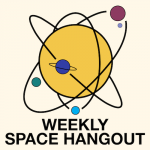Podcaster: Host : Fraser Cain ; Guest: Dr. Mario Borunda, Dr. Kimberly Cartier, Dr. Alex Teachey, C.C. Petersen

Title: Weekly Space Hangout :Advances In Warp Drive Technology With Dr. Mario Borunda
Link: Cosmoquest: http://cosmoquest.org
Description: Today’s story:
- New Venus missions!
- Delays on JWST. (What a shocker!)
- An ancient collision between the MW and a sausage galaxy?
- Is our solar system normal?
Host: Fraser Cain ( @fcain )
Special Guest:
This week we welcome Dr. Mario Borunda to the show. In his recent article published on EarthSky.com, Mario discusses advancements in warp drive technology research. You can read his article, “Warp Drives: Physicists Give Chances Of Faster-Than-Light Space Travel A Boost,” here: https://earthsky.org/space/warp-drive-chances-of-faster-than-light-space-travel/
Dr. Borunda double-majored in Physics and Mathematics earning his B.S. from the University of Texas at El Paso in 2003. He received his Ph.D. in Physics from Texas A&M University in 2008. He spent three years as a postdoc and nine months as a research associate at Harvard University. In September 2012 he became a faculty member of the physics department at Oklahoma State University. Dr. Borunda has also been a visiting researcher at Harvard University.
Mario has performed research in several areas. His work at UTEP, performed with Jorge Lopez, involved using α-particle spectroscopy as a teaching tool. As a graduate student (advised by Jairo Sinova) and post-doc (under Eric Heller) he performed calculations on electronic conductivity in two-dimensional systems, proposed and described an atom-laser coupling scheme that induces spin-orbit interaction in ultra-cold atoms, and simulated electron transport in graphene. At Oklahoma State his research has focused in quantum information, the quantum-to-classical boundary in chaotic systems, and using theoretical methods to predict novel materials for energy production and electronic applications. More details about the work performed at OSU is described in the research sections of The Borunda Research Group’s website: https://borunda.okstate.edu/members.html#borunda
Dr. Borunda is enthusiastic about working with undergraduate students and has worked towards producing a positive impact as undergraduate research coordinator for the OSU physics program, with minority students through the OK-LSAMP program, as faculty advisor of OSU’s SACNAS chapter, and as technical officer with the National Society of Hispanic Physicists.
Regular Guests:
- Dr. Kimberly Cartier ( http://KimberlyCartier.org & @AstroKimCartier )
- Dr. Alex Teachey ( https://alexteachey.wordpress.com/ & @alexteachey )
- C.C. Petersen ( http://thespacewriter.com/wp/ & @AstroUniverse & @SpaceWriter )
Today’s sponsor: Big thanks to our Patreon supporters this month: David Bowes, Dustin A Ruoff, Brett Duane, Kim Hay, Nik Whitehead, Timo Sievänen, Michael Freedman, Paul Fischer, Rani Bush, Karl Bewley, Joko Danar, Steven Emert, Frank Tippin, Steven Jansen, Barbara Geier, Don Swartwout, James K. Wood, Katrina Ince, Michael Lewinger, Phyllis Simon Foster, Nicolo DePierro, Tim Smith.
Please consider sponsoring a day or two. Just click on the “Donate” button on the lower left side of this webpage, or contact us at signup@365daysofastronomy.org.
Or please visit our Patreon page: https://www.patreon.com/365DaysOfAstronomy
End of podcast:
365 Days of Astronomy
=====================
The 365 Days of Astronomy Podcast is produced by Planetary Science Institute. Audio post-production by Richard Drumm. Bandwidth donated by libsyn.com and wizzard media. You may reproduce and distribute this audio for non-commercial purposes.
This show is made possible thanks to the generous donations of people like you! Please consider supporting to our show on Patreon.com/365DaysofAstronomy and get access to bonus content.
After 10 years, the 365 Days of Astronomy podcast is poised to enter its second decade of sharing important milestone in space exploration and astronomy discoveries. Join us and share your story. Until tomorrow! Goodbye!

